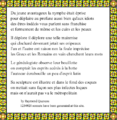User:Nadiners/ Typographical Hallucinations
Cybernetics and Ghosts
Cybernetics and Ghosts was a lecture delivered by Italo Calvino in 1967. In this lecture he explores the role of a storyteller and reader. After describing the birth of language and means of communication in the primitive ages, Calvino imagines a situation where the author is replaced by a machine.
He mentions that the world is looked upon as 'discrete', in the mathematical sense, where there are finite combinations of sensory and motor organs, finite still being immeasurable.It is divided into parts rather than being continuous or flowing, having a spirit. But then says both notions; finite and continuous, are true to this world. Language, is the most complex and unpredictable machine being deciphered by humans. He talks about Oulipo a group founded in France by Raymond Queneau. Here they experimented with mathematics and literature. Cent milles milliard de poemes, is a machine for making sonnets.
He raises the question whether it would be possible to construct a machine who could replace the author. Thinking it possible, he notes it would not be worth the trouble in constructing one.
A poetic electronic machine, would follow rules, 'an instrument of chance' serving typical human needs. 'The true literature machine will be one that itself feels the need to produce disorder'. A true literally machine would be one with conscience, which he estimates is far from being the case. He affirms that the machine cannot reach human creativity 'litterature will continue to be a "place" of privilege within the human consciousness.'
what is the role of the reader and how important is the author when text is considered? how should narrative be analysed and how is it constructed? The text offers the reader many possibilities of interpretation.
The ghosts are the human leftovers from the poetic machines.
Calvino leaves the discussion open, he makes a point, contradicts it, raises more questions...
One Thousand Billion Poems
One Thousand Billion poems is a set of 10 sonnets published in 1961 by Raymond Queneau. Each sonnet has the same rhyme scheme and each scheme is grammatically correct, any line can be combined with any from the 9 others. So that makes; 1014 which equals to a hundred thousand billion different poems. It could take roughly a hundred and forty million years to read, if read 24 hours a day consecutively.
The printed version’s design of lines slit into thin strips, is not easy to manipulate. So the reader is more inclined to read the sonnets that are naturally paired and that do in fact follow the same subject and make sense. A digital version pushes the idea of giving true randomness to these poems. The first digital version was programmed in 1975 by Paul Braffort, making the work more easily accessible.
This poem led to the founding of the OULIPO (ouvroir de literature potentielle/workshop of potential literature) in 1960 with François Le Lionnais, a mathematician, there they experimented with mathematics’ role within literature.
There have been 3 attempts to translate this to English: John Crombie, Stanley Chapman and Beverley Charles Rowe.

